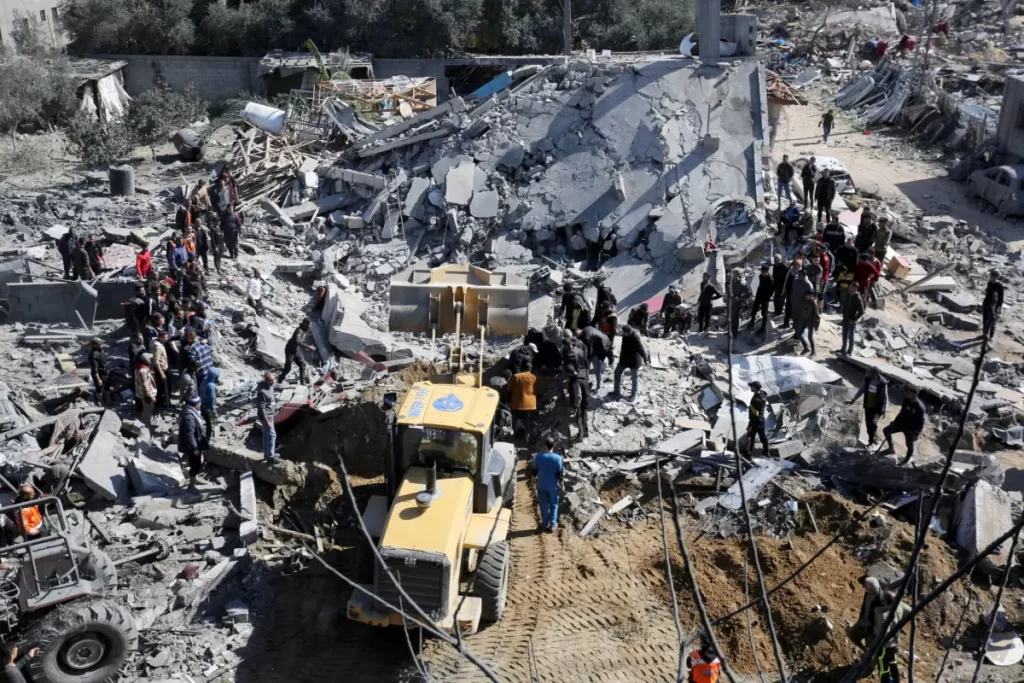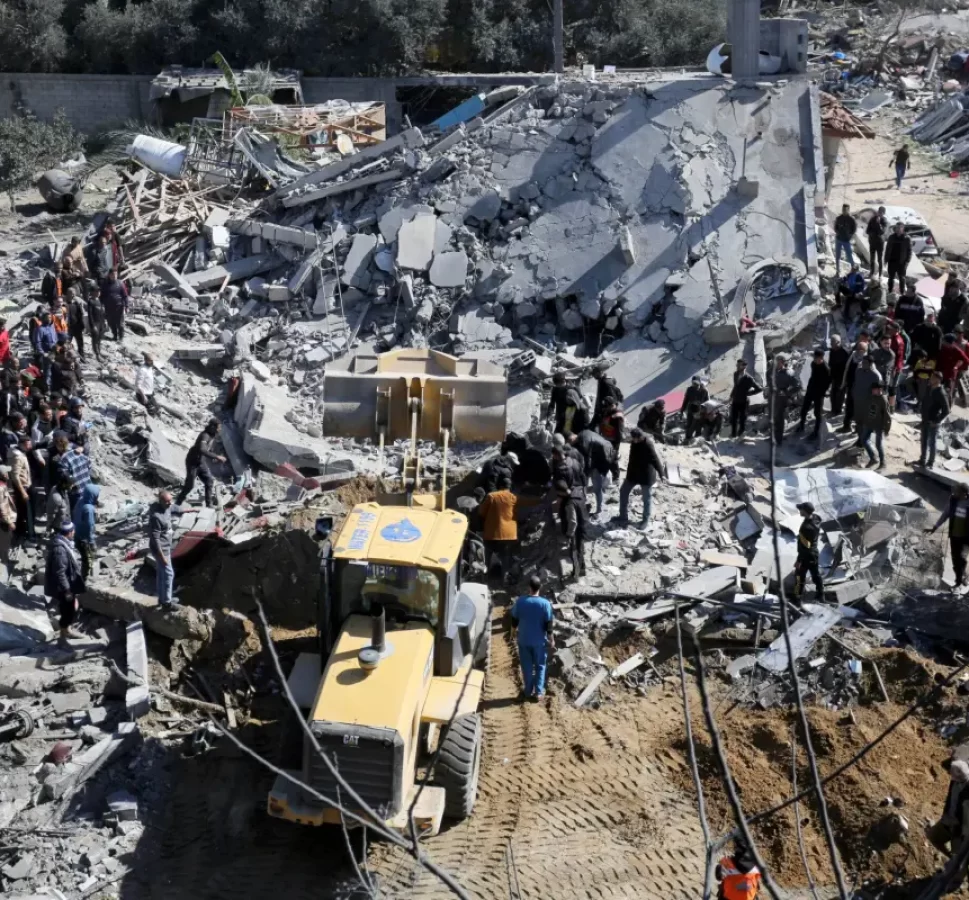
Experts say Israel’s Western allies are risking sanction from the ICJ if arms shipments continue .
An attack on a humanitarian convoy, killing several foreign aid workers. The destruction of a hospital with hundreds killed inside. An air raid on a consulate in a foreign country.
These are just some of Israel’s actions in Gaza and the region this week, adding to the accusations of war crimes levelled against it, and even genocide.
But, even as Israel’s Western allies face the possibility of charges for complicity in war crimes, many continue to send weapons to Israel and withhold funds from the main United Nations agency working in Gaza, despite the very real threat of famine among its population of roughly two million people.
The charges of genocide – and the continuing case brought forward by South Africa at the International Court of Justice (ICJ) – have done little to shift any of this.
Late last month, the UN Special Rapporteur on human rights in the Palestinian Territory Francesca Albanese sent a warning to Israel’s Western allies, issuing a report stating that there were clear indications that Israel was violating the UN Genocide Convention, and emphasising that complicity in genocide was also “expressly prohibited, giving rise to obligations for third states”.
On this basis, Nicaragua has already taken Germany to the ICJ for violating international law by continuing to arm Israel. Individual groups around the world are also pursuing cases against their governments.
And yet, Germany continues to provide arms to Israel. Other large-scale providers of weapons, such as the US, the UK and Australia have also stopped short of suspending weapons sales – even as more than 32,000 people have been killed in Gaza and more are killed every day.
“A failure by states such as Germany, the UK and the US to reassess how they are providing support to Israel provides grounds to question whether those states are violating the obligation to prevent genocide or could even at some point be considered complicit in acts of genocide or other violations of international law,” Michael Becker, a professor of international human rights law at Trinity College in Dublin who has previously worked at the ICJ, told Al Jazeera.
Future blame
These countries are finding it harder to plead ignorance. In a leaked recording on Saturday, Alicia Kearns, a Conservative member who is the chair of the UK parliament’s foreign affairs committee, is heard saying that UK government lawyers have advised that Israel has breached international humanitarian law, but the British government has not announced it.
Kearns stood by the comments when later asked.
According to Charles Falconer, former UK lord chancellor, if the British government concedes that Israel has violated international law, it will have no choice but to stop sharing intelligence with Israel.
A spokesperson for the UK foreign ministry stated that advice on Israel’s adherence to international humanitarian law remained under review and that: “Ministers act in accordance with that advice, for example when considering export licenses.”
Specific legal advice to the government was confidential, they said.
A leading British barrister, however, warned that the UK and other countries will be fearful of any future legal culpability.
“All governments have teams of lawyers providing constant advice on who they are exporting weapons to,” Geoffrey Nice, who led the prosecution of Slobodan Milosevic, told Al Jazeera. “It’s inconceivable that the advice the British government has received [on events in Gaza] is materially different from that other countries have received.”
“The atrocity that happened on October 7th and the taking of the hostages was and is horrific,” Nice continued. “However, Israel needs to show that it is acting proportionally, in avoiding civilian casualties.”
“If we ever reach the point of a criminal hearing into the conduct of this war, as I expect we may, you’ll see many of the larger countries who are now backing Israel doing everything they can to prevent Israeli witnesses taking the stand to say, we were acting with their consent as they provided the arms.”
Abetting famine
Last week, the ICJ ordered Israel to increase the flow of humanitarian aid into Gaza without delay. But, despite the ever-growing risk of famine in the Palestinian enclave, Israel continues to hinder the work of the NGOs attempting to distribute food aid.
After Tuesday’s attack, which killed seven World Central Kitchen staff members, both the WCK and refugee aid organisation Anera have announced the suspension of their work in Gaza to reassess the security situation and safety of their staff.
Israel continues to block the UN’s agency for Palestinian refugees, UNRWA, from accessing northern Gaza, where hunger is at its most extreme. Israel has accused UNRWA employees of participating in Hamas’s October 7 attack, leading to a host of countries suspending funding to UNRWA.
However, Israel has yet to provide evidence to support its claim, and several donors, including the European Union, Canada and Australia, have resumed funding.
“Yes, I think cutting off funding for UNRWA could constitute a war crime,” Francis Boyle, a University of Illinois professor who has served as counsel to the Palestinian Authority, told Al Jazeera.
In addition to the breaches of humanitarian law “the US and others will be in breach of a number of articles of the genocide convention, which they could and should be held accountable for”, he said.
Al Jazeera has requested access to the Israeli allegations against UNRWA several times, and is currently pursuing a complaint against the British government, which has failed to meet its own deadline in responding to Al Jazeera’s Freedom of Information Request.
If it is determined that Israel is carrying out war crimes within Gaza it is unlikely to come through a single legal determination, but the existing conditions within Gaza that states such as the US, the UK, Germany and others have created, either through withholding funding for UNRWA, in the face of potential famine or by providing the weapons that have furthered Israel’s war ends.
“Yes, I think guilt can be applied retrospectively,” Professor Boyle said. “If the weapons that have been provided have been used to create the devastation we’re seeing in Gaza then, yes. I think they’re guilty as sin.”






